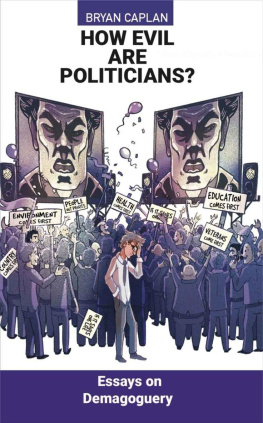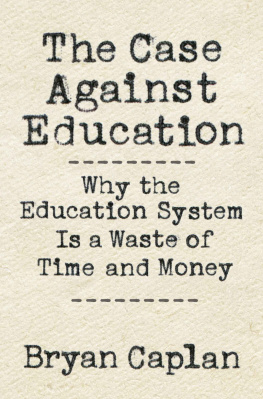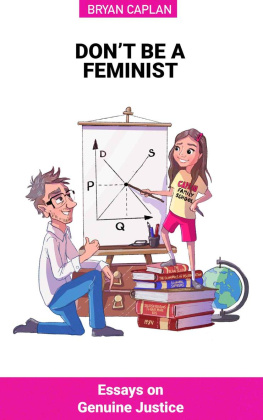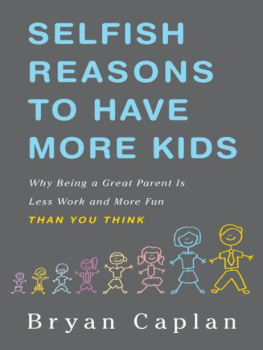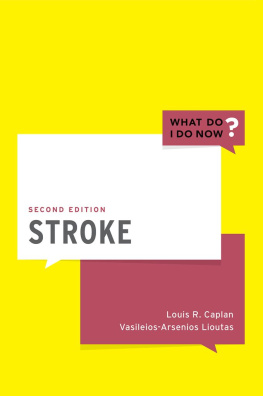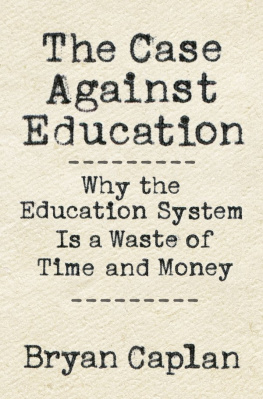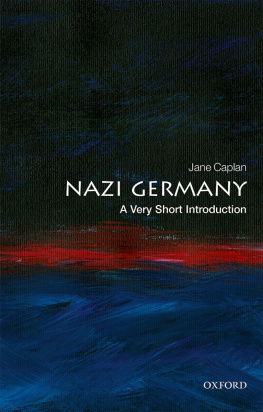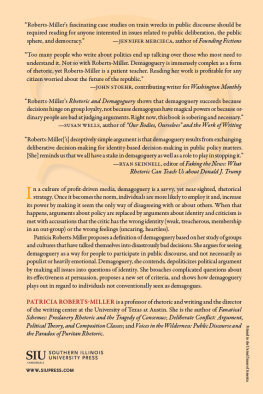Bryan Caplan - How Evil Are Politicians?: Essays on Demagoguery
Here you can read online Bryan Caplan - How Evil Are Politicians?: Essays on Demagoguery full text of the book (entire story) in english for free. Download pdf and epub, get meaning, cover and reviews about this ebook. year: 2022, publisher: Bet On It Books, Fairfax, Virginia, genre: Politics. Description of the work, (preface) as well as reviews are available. Best literature library LitArk.com created for fans of good reading and offers a wide selection of genres:
Romance novel
Science fiction
Adventure
Detective
Science
History
Home and family
Prose
Art
Politics
Computer
Non-fiction
Religion
Business
Children
Humor
Choose a favorite category and find really read worthwhile books. Enjoy immersion in the world of imagination, feel the emotions of the characters or learn something new for yourself, make an fascinating discovery.
- Book:How Evil Are Politicians?: Essays on Demagoguery
- Author:
- Publisher:Bet On It Books, Fairfax, Virginia
- Genre:
- Year:2022
- Rating:3 / 5
- Favourites:Add to favourites
- Your mark:
- 60
- 1
- 2
- 3
- 4
- 5
How Evil Are Politicians?: Essays on Demagoguery: summary, description and annotation
We offer to read an annotation, description, summary or preface (depends on what the author of the book "How Evil Are Politicians?: Essays on Demagoguery" wrote himself). If you haven't found the necessary information about the book — write in the comments, we will try to find it.
How Evil Are Politicians?: Essays on Demagoguery — read online for free the complete book (whole text) full work
Below is the text of the book, divided by pages. System saving the place of the last page read, allows you to conveniently read the book "How Evil Are Politicians?: Essays on Demagoguery" online for free, without having to search again every time where you left off. Put a bookmark, and you can go to the page where you finished reading at any time.
Font size:
Interval:
Bookmark:
Bryan Caplan
How Evil Are Politicians?
Essays on Demagoguery
First published by Bet On It Books, Fairfax, Virginia 2022
Copyright 2022 by Bryan Caplan
All rights reserved. No part of this publication may be reproduced, stored or transmitted in any form or by any means, electronic, mechanical, photocopying, recording, scanning, or otherwise without written permission from the publisher. It is illegal to copy this book, post it to a website, or distribute it by any other means without permission.
First edition
Editing by Ashruta Acharya
Cover art by @sengsavane
To Don Boudreaux, who knows a demagogue when he sees one.
I think politicians are, by and large, evil people. When I shared my verdict with a journalist friend, he strongly objected. He rightly pointed out that hes had ample personal interaction with politicians. In his experience, politicians of both parties generally want to do the right thing. Whatever their intellectual errors, their virtue is intact. My mental image of villainous politicians is at odds with the facts.
Im happy to grant that my journalist friends first-hand experience with politicians far exceeds my own. But Im confident that if I saw what he saw, my doleful verdict would stay the same. Why? Because my standards of moral conduct are much higher than his, in two main ways.
First, virtuous people cant just conform to the expectations of their society. Everyone has at least a modest moral obligation to perform due diligence to investigate whether their societys expectations are immoral. And whenever their society fails to measure up, virtuous people spurn social expectations and do the morally right thing.
Second, anyone in a position of political power has a greatly elevated moral obligation to perform this due diligence. Yes, with great power comes great responsibility. If youre in a position to pass or enforce laws, lives and freedom are in your hands. Common decency requires you to act with extreme moral trepidation at all times, ever mindful of the possibility that youre trampling the rights of the morally innocent.
Note: Neither of these principles claims that politicians have to share my libertarian philosophy in order to be decent human beings.1 Theyre procedural. They require every human being to seek out and seriously consider the main moral critiques of the status quo. And they enjoin politicians to make this intellectual hygiene their top priority. Until they calmly recuse themselves from their society and energetically weigh a wide range of moral arguments, they have no business lifting a political finger.
At this point, the iniquity of practicing politicians should be clear. How much time and mental energy does the average politician pour into moral due diligence? A few hours a year seems like a high estimate. They dont just fall a tad short of their moral obligations. Theyre too busy passing laws and giving orders to face the possibility that theyre wielding power illegitimately.
Such negligence is scarcely surprising. After all, whats in it for the politicians? Political systems reward them for seeming good by conventional standards. If were lucky, this spurs leaders to do what most people consider good. More likely, it spurs leaders to spin control packaging even their worst actions in conventional moral garb. If theres a political system that affirmatively rewards politicians for conscientiously questioning mainstream moral standards, Ive never heard of it. Politicians have no excuses for their shameful behavior, but like almost all wrong-doers, they have reasons.
Admittedly, if it turned out that our societys conventional moral standards were basically right, our politicians vice would be harmless. Thats a much bigger question. But whatever the whole truth about morality might be, politicians including the Americans politicians my journalist friend defends are almost invariably guilty of pervasive gross moral negligence. Politicians, repent!
December 7, 2015
***
Notes
- Caplan, Bryan. Huemers Common-Sense Libertarianism.EconLog, January 25, 2013.
G reed is good. After a few years in economics, the goodness of greed seems like common sense. But its not. In a randomly selected social environment, greed is brutal. If youre carrying a bag of gold and meet a well-armed stranger in a remote jungle, you wouldnt say, As long as hes greedy, I have nothing to worry about. The knowledge that Nigerian spammers are greedy doesnt incline you to send them your money. If you were looking for a caretaker for your elderly mother, discovering that a job candidate is extremely greedy would be a strong mark against him. As Marge Gunderson sadly muses at the end of Fargo, So that was Mrs. Lundegaard on the floor in there. And I guess that was your accomplice in the wood chipper. And those three people in Brainerd. And for what? For a little bit of money. Theres more to life than a little money, you know. Dont you know that?
What economics teaches is not that greed is good, but that good incentives transform this questionable motive into awesome results. Greed plus property rights plus competition plus rationality plus reputation is good. Greed alone is film noir.
In Public Choice, also known as economics of politics, we usually assume that politicians are motivated not by greed, but by power-hunger. Of course, we rarely utter the word power-hunger. Instead, we call it vote maximization, just as we call greed profit maximization. But when Public Choice pictures politicians, it pictures humans filled with lust for power.
Is this a reasonable picture of politicians psyches? Absolutely. That politicians crave power is as undeniable as that businesspeople crave profits. If you look at political history before the rise of democracy, we see virtually nothing other than dictators struggling to cement their power internally and expand their power externally. When these dictators lost wars, they lost territory and subjects, because virtually every dictator wanted to rule over as much land and as many people as possible.
Under democracy, politicians are less candid about their motives; they need us to like them, and power-hunger is not likeable.1 But given its ubiquity throughout most of political history, can we really believe that the motive of power-hunger is no longer paramount? One of my favorite political insiders privately calls politicians of both parties psychopaths and hes on to something. Rising high on the pyramid of power is hard unless the love of power fuels your ascent.
In a randomly-selected social environment, power-hunger like greed is brutal. Just look at the history of warfare in all its hideousness the endless bloodbaths over slivers of territory. Remember how leaders terrorized their rivals, their potential rivals, their imagined rivals. Its sickening. If Fargo were a war story, and Marge Gunderson hunted war criminals, she might have sadly mused, So that was Sarajevo on the floor in there. And I guess those were your accomplices in the mass grave. And those three hundred thousand people in Bosnia. And for what? For a little bit of power. Theres more to life than a little power, you know. Dont you know that?
In dictatorships, the causal chain from power-hunger to bad results is obvious. The fundamental question of Public Choice is: Does democracy motivate power-hungry politicians to do good despite their bad intentions? My admirable nemesis, Donald Wittman, tirelessly argues Yes, but to no avail. Democracy out-performs dictatorship, but thats damning with faint praise.
Once you thank the stars you arent ruled by Louis XIV or Lenin, a grim truth remains: democracy gives power-hungry politicians
Next pageFont size:
Interval:
Bookmark:
Similar books «How Evil Are Politicians?: Essays on Demagoguery»
Look at similar books to How Evil Are Politicians?: Essays on Demagoguery. We have selected literature similar in name and meaning in the hope of providing readers with more options to find new, interesting, not yet read works.
Discussion, reviews of the book How Evil Are Politicians?: Essays on Demagoguery and just readers' own opinions. Leave your comments, write what you think about the work, its meaning or the main characters. Specify what exactly you liked and what you didn't like, and why you think so.

